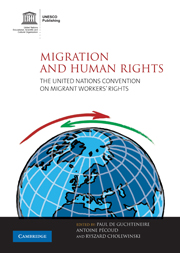Book contents
- Frontmatter
- Contents
- List of figures
- List of tables
- Notes on contributors
- Abbreviations
- 1 Introduction: The UN Convention on Migrant Workers' Rights
- PART I
- 2 Migration and human rights: the uneasy but essential relationship
- 3 Role of civil society in campaigning for and using the ICRMW
- 4 Committee on Migrant Workers and implementation of the ICRMW
- 5 Migrants' rights in UN human rights conventions
- 6 The need for a rights-based approach to migration in the age of globalization
- PART II
- Annex 1 International Convention on the Protection of the Rights of All Migrant Workers and Members of Their Families Adopted by General Assembly Resolution 45/158 of 18 December 1990
- Annex 2 Ratifications of ILO Conventions 97 and 143 and of ICRMW as at June 2009
- Index
- References
6 - The need for a rights-based approach to migration in the age of globalization
Published online by Cambridge University Press: 02 December 2010
- Frontmatter
- Contents
- List of figures
- List of tables
- Notes on contributors
- Abbreviations
- 1 Introduction: The UN Convention on Migrant Workers' Rights
- PART I
- 2 Migration and human rights: the uneasy but essential relationship
- 3 Role of civil society in campaigning for and using the ICRMW
- 4 Committee on Migrant Workers and implementation of the ICRMW
- 5 Migrants' rights in UN human rights conventions
- 6 The need for a rights-based approach to migration in the age of globalization
- PART II
- Annex 1 International Convention on the Protection of the Rights of All Migrant Workers and Members of Their Families Adopted by General Assembly Resolution 45/158 of 18 December 1990
- Annex 2 Ratifications of ILO Conventions 97 and 143 and of ICRMW as at June 2009
- Index
- References
Summary
Introduction
The ICRMW, and the reluctance of some states to ratify it, symbolizes sharpening clashes between the conditions of globalization and a rights-based approach to governance. The question of migrants' rights represents a cutting edge of contention between the consequences of the economic logic of globalization vs the moral values embodied in human rights concepts and law. This contention is marked most dramatically by the conditions that many migrant workers face in host countries around the world. As the 2004 International Labour Conference observed:
Despite the positive experiences of migrant workers, a significant number face undue hardships and abuse in the form of low wages, poor working conditions, virtual absence of social protection, denial of freedom of association and workers' rights, discrimination and xenophobia, as well as social exclusion. Gaps in working conditions, wages and treatment exist among migrant workers and between migrant and national workers. In a significant number of cases, unemployment rates, job security and wages differ between regular migrant workers and national workers
(ILO, 2004).Widespread abuse and exploitation of migrant workers – often described in terms of forced labour and slavery-like situations – stand in marked contrast to the promises that economic globalization will bring better conditions and social protection to the lives of people around the world.
With increasing competition for resources, markets and capital, downward pressures on incomes and conditions of work appear to be generalized across industrialized countries as well as elsewhere.
Information
- Type
- Chapter
- Information
- Migration and Human RightsThe United Nations Convention on Migrant Workers' Rights, pp. 150 - 168Publisher: Cambridge University PressPrint publication year: 2009
References
Accessibility standard: Unknown
Why this information is here
This section outlines the accessibility features of this content - including support for screen readers, full keyboard navigation and high-contrast display options. This may not be relevant for you.Accessibility Information
- 8
- Cited by
